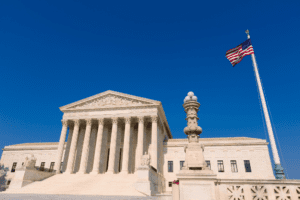 Justice Breyer continued: The Court’s near-exclusive reliance on history is not only unnecessary, it is deeply impractical. It imposes a task on the lower courts that judges cannot easily accomplish. Judges understand well how to weigh a law’s objectives against the methods used to achieve those objectives (its “means”). Judges are far less accustomed to resolving difficult historical questions. Courts are, after all, staffed by lawyers, not historians. Legal experts typically have little experience answering contested historical questions or applying those answers to resolve contemporary problems. The Court’s insistence that judges and lawyers rely nearly exclusively on history to interpret the Second Amendment thus raises a host of troubling questions.
Justice Breyer continued: The Court’s near-exclusive reliance on history is not only unnecessary, it is deeply impractical. It imposes a task on the lower courts that judges cannot easily accomplish. Judges understand well how to weigh a law’s objectives against the methods used to achieve those objectives (its “means”). Judges are far less accustomed to resolving difficult historical questions. Courts are, after all, staffed by lawyers, not historians. Legal experts typically have little experience answering contested historical questions or applying those answers to resolve contemporary problems. The Court’s insistence that judges and lawyers rely nearly exclusively on history to interpret the Second Amendment thus raises a host of troubling questions.
Consider, for example, the following. Do lower courts have the research resources necessary to conduct exhaustive historical analyses in every Second Amendment case? What historical regulations and decisions qualify as representative analogues to modern laws? How will judges determine which historians have the better view of close historical questions? Will the meaning of the Second Amendment change if or when new historical evidence becomes available? And, most importantly, will the Court’s approach permit judges to reach the outcomes they prefer and then cloak those outcomes in the language of history? See S. Cornell, Heller, New Originalism, and Law Office History: “Meet the New Boss, Same as the Old Boss,” 56 UCLA L. Rev. 1095, 1098 (2009) (describing “law office history” as “a results oriented methodology in which evidence is selectively gathered and interpreted to produce a preordained conclusion”).
Here, Justice Breyer appears to take a thinly-veiled shot at Justice Thomas, the author of the majority opinion. He implies that the majority’s approach is results-oriented. A fair response to Justice Breyers alleged concerns for lower court’s ability to resolve historical questions is that Justice Thomas has done so for them in his majority opinion. Another fair response is that a historical review is required with Second Amendment issues because the text of the Second Amendment is more cryptic.
